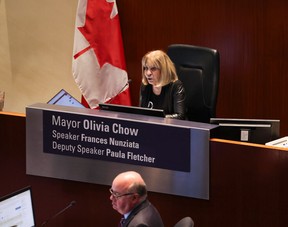Article content
Meet the new neighbour. He’s a bartender!

Meet the new neighbour. He’s a bartender!
Advertisement 2
Article content
Article content
Article content
A proposal going before city council this week recommends that small businesses be allowed to operate on residentially zoned properties across Toronto. That has critics fearing what is today a house might soon become a cafe with a noisy patio, or even a bar or a pot shop.
Frances Nunziata expressed concerns about the idea at this month’s meeting of the city’s planning and housing committee. The York South-Weston councillor said she fears the system would be abused, and since liquor licences are governed by the province, the city would lose what control it has in terms of where a bar can go.
“In the report, they didn’t really say why they’re doing this and what do they gain from it,” Nunziata told The Toronto Sun. “I don’t know what the gain is. It doesn’t make sense to me.”
Article content
Advertisement 3
Article content
Michael Noble, a project manager with the city’s planning department, said the proposal, in part, would “legalize things that are not problematic that people are doing today,” such as allowing an accountant to meet with clients in her home, or a journalist to convert his shed into a home office.
The idea of getting more small-scale retail and eateries – perhaps occupying just the main floor of a modest home – fits with the city’s ideology about making neighbourhoods walkable and sustainable. But the proposal’s biggest selling point may be its downfall.
“I think people agree generally that having small-scale retail service near your home is a good thing,” Noble said.
“People like the idea conceptually of a small grocery store or a coffee shop, but I think they do have concerns about things that we may not have control over. Then it just comes down to a philosophical question of, are you willing to prioritize the option of having this in the neighbourhood and try to control for some of the most concerning aspects of it? … Or, do you say, ‘You know what, we’re not prepared to go take that step right now and we need to do more study, or something to that effect?”
Advertisement 4
Article content
The proposal would allow a few types of businesses into neighbourhoods, things like art galleries or pet groomers that are intended to work in a small space with minimal parking. Also on the list are takeout dining, outdoor patios and retail.
The city says food can only be sold if it’s prepared off-site. The idea is to keep the store’s footprint small, cutting down on things like smells, appliance noise and delivery traffic.
However, if a business can serve food, it can apply for a liquor licence – and those are given out by the Alcohol and Gaming Commission of Ontario, not the city. Similarly, a retail outlet might be approved to sell wine or marijuana by the AGCO.
“The way that those are regulated,” Noble said, “if we permit a retail store on a site, in theory, that retail store could be a cannabis store … If we’re allowing you to sell fruits and vegetables on a site, or footwear, or whatever, then cannabis theoretically could also be permitted on the site.”
Advertisement 5
Article content

Councillor Gord Perks, chairman of the planning committee, told those at the meeting they can’t “conflate” the province’s “presumptive right” to sell liquor with what’s in the motion.
“It is true that a couple of key issues have been raised here,” he said, “but we have to remember that there are actually 20 or 30 important reasons why we would do this.”
But as Perks said, alcohol was just one of the issues.
At the planning committee meeting, Councillor Jamaal Myers expressed concerns about enforcement – and the staffing that would come with that. A city official gave him a very rough estimate that “a team of 25” bylaw officers might be needed, with an associated cost of more than $3 million.
“I just can’t get to yes without seeing proper resources being devoted to actually support the enforcement of the bylaw, and that’s my concern,” Myers said at the meeting. “It’s hard enough to get the rooming house bylaw enforced, on-street parking, all these other things that just drive residents crazy. Adding something else on top of that without the proper resources in place, I just don’t think it’s where we need to go right now.”
Advertisement 6
Article content
Nunziata said she knows about a parcel distribution centre being run as a home business in her ward, with trucks coming and going and “hundreds of boxes being delivered.” Noble said there’s a line between a warehouse – which wouldn’t be allowed under the proposal – and a store that does a lot of online business, but ultimately that’s the sort of thing a bylaw officer would have to investigate.

The committee meeting heard from constituents worried about loud patios and drunken revelry moving in next door. One of them, Nicole Tataj, with the Beaconsfield Village Residents Association, also complained the planning department hadn’t done enough to consult the public.
“I’m surprised,” Nunziata added, noting city planners said “they did consulting, but I don’t know who they consulted because I think that most of the residents out there don’t even know what this means. If it was explained to residents, I’m sure that they would have had a lot more residents or residents’ associations participating in those meetings that they had.
Advertisement 7
Article content
“I know for sure that not everybody understands this.”
There’s also the question of what the city could do if abuse runs rampant, or if a once sleepy street turns into a de facto shopping mall.
Noble said there’s no mechanism planned to reverse these changes, but expressed doubt the system would spark an explosion of shops.
“There’s only so many small retail stores or coffee shops that a local neighbourhood can support. Often it’s not even one,” Noble said. “The expectation is not that suddenly 15 stores are opening up in the middle of the neighbourhood.”
The report is going before council without recommendations, as the planning committee was split on what to do with it. Nunziata said she’s hoping council will defer it, or just shelve the proposal.
“I think this would be a nightmare,” she said.
Recommended from Editorial
Article content